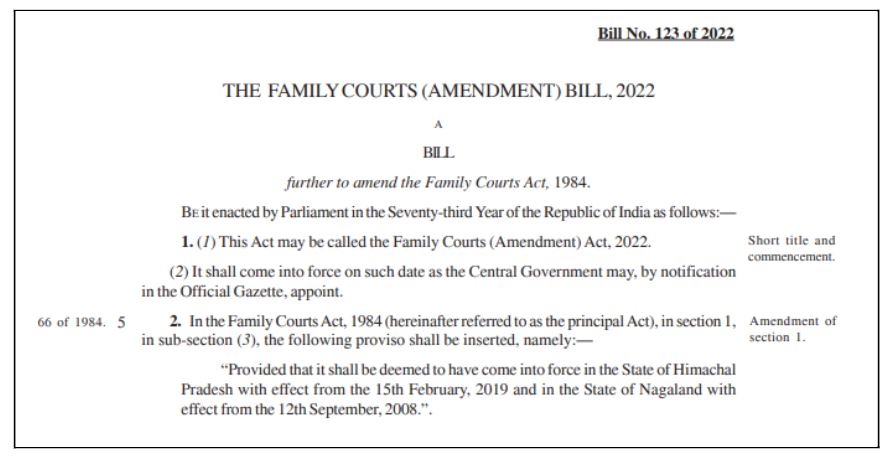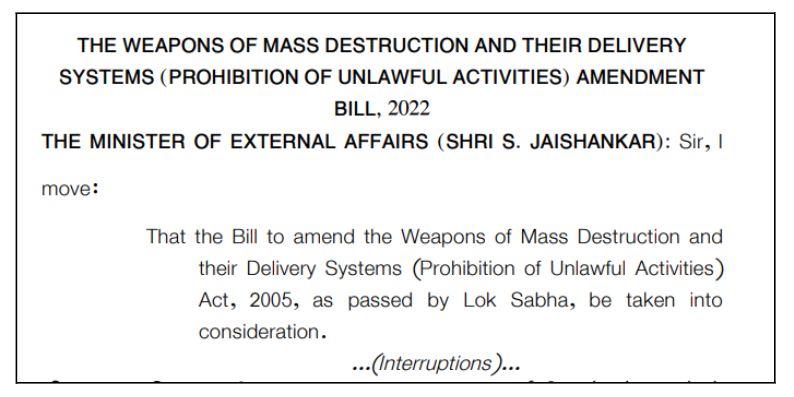The Monsoon Session of the Parliament began on 18 July 2022. It is scheduled to be held till 12 August 2022 with a total of 18 sittings spread over 26 days. However, no major business took place in the first few days with repeated disruptions. Here is a review.
The Monsoon Session of the Parliament began on 18 July 2022. It is scheduled to be held till 12 August 2022 with a total of 18 sittings spread over 26 days. The Presidential and Vice-Presidential elections will be taking place during the session. A total of 32 Bills are likely to be taken up in this session.
Key Developments
At the beginning of the session, PM Narendra Modi made a statement in which he spoke about ‘Azadi Ka Amrit Mahotsav’ and the role of the Parliament to achieve the goals in the next 25 years as India will celebrate its centenary of Independence. In his address to the Rajya Sabha, the outgoing Vice President Venkaiah Nadu reminded everyone that it was the last session in the 75th year of India’s Independence and added that during the last 13 sessions in his tenure, 141 of the 248 scheduled full sittings, accounting for 57% of the total sittings, were disrupted partly or fully. He stated that “Better late than never. It is time now to be different and better.” He also asked the members to give their best to make the session a memorable one. This would also be the last session of the Rajya Sabha to be chaired by Venkaiah Naidu.
The first day of the session also witnessed the Presidential Polling. There was a total of 4,796 electors on the list of the Electoral College for the Presidential Election. According to the official press release of the Election Commission, out of a total of 771 MPs and 4,025 MLAs entitled to vote, over 99% cast their votes. Chhattisgarh, Goa, Gujarat, Himachal Pradesh, Kerala, Karnataka, Madhya Pradesh, Manipur, Mizoram, Puducherry, Sikkim, and Tamil Nadu recorded 100% voting by MLAs. The Vice-Presidential Polling is scheduled to take place on 06 August 2022.
In the Rajya Sabha, the silence was observed as a mark of respect for the memory of former Japanese PM Shinzo Abe, ex-UAE President Sheikh Khalifa Bin Zayed Al Nahyan, former Kenya President Mwai Kibaki, legendary Hindustani classical musician Pandit Sivakumar Sharma, and other prominent personalities. Newly elected/nominated members including cricketer Harbhajan Singh, and athlete P T Usha took the oath. Along with P T Usha, music director Ilaiyaraaja, screenwriter V. Vijayendra Prasad and Philanthropist D. Veerendra Heggade have also been nominated as Rajya Sabha members.
In terms of discussions and debates, this session of the Parliament has not seen any significant business yet since both the Houses were adjourned multiple times due to sloganeering by opposition members over issues like inflation, price hike, and the newly introduced GST on dairy and food items. In the Lok Sabha, some issues were discussed briefly under Rule 377 such as the introduction of air-conditioned rail ambulance, the plight of traditional Indian fishermen, RINL tender relating to coke oven batteries, export of agricultural products, development of sports infrastructure and facilities under ‘Khelo India Yojana’ in Gopalganj district, Bihar, about the need to curb fraudulent mobile app loan, further education of Ukraine-returnee medical students in Indian medical colleges, provision of salary, allowances and other facilities to wardens of civil defence service, among others.
Bills taken up
In this 2022 monsoon session, 32 Bills have been shortlisted for introduction, consideration, and passing in the Parliament, out of which 14 have been finalized. Some of the important bills which are likely to be taken up in this session include the Wildlife (Protection) Amendment Bill, 2021, The Indian Antarctic Bill, 2022, The Maintenance and Welfare of Parents and Senior Citizens (Amendment) Bill, 2019, The Insolvency and Bankruptcy Code (Amendment) Bill, 2022, and The Weapons of Mass Destruction and their Delivery Systems (Prohibition of Unlawful Activities) Amendment Bill, 2022. About 8 of these bills are already pending in Parliament while the remaining 24 are new.
On the first day of the session, The Family Courts (Amendment) Bill, 2022 was introduced in Lok Sabha by the Union Minister of Law and Justice Kiren Rijiju. The amendment bill seeks to amend the Family Courts Act of 1984 with the objective of overcoming the issue of lack of jurisdiction of Family Courts in the States of Himachal Pradesh and Nagaland. The Family Courts Act, 1984 was enacted to establish family courts with a view to promote conciliation and secure speedy settlement of disputes relating to marriage and family affairs.

The Weapons of Mass Destruction and their Delivery Systems (Prohibition of Unlawful Activities) Amendment Bill, 2022 was introduced by the External Affairs Minister in the Lok Sabha in the previous Budget session. The Bill seeks to expand the 2005 law to include a ban on funding of weapons of mass destruction and freeze, seize or attach funds or other financial assets or economic resources owned or controlled wholly or jointly by such person. The Bill was passed by the Lok Sabha in the Budget session. Amidst the sloganeering, Union External Affairs Minister S Jaishankar moved the Weapons of Mass Destruction Bill in Rajya Sabha. However, the House was adjourned soon after. The discussions on the Bill have been postponed to Monday after MoS for Parliamentary Affairs V Muralidharan, requested that the bill be discussed in the presence of opposition members.

Important Standing Committee Reports tabled
Action Taken report detailing the actions taken by the Government on the recommendations/observations contained in the Thirteenth Report of the Committee on ‘Procurement, Storage and Distribution of Food grains by Food Corporation of India’ pertaining to the Ministry of Consumer Affairs, Food and Public Distribution (Department of Food and Public Distribution)’ was presented in the Lok Sabha. The report consisted of measures suggested for effective procurement, improving storage capacity, reduction of loss in storage and transit, among others. Only 75% of the recommendations have been accepted by the government.
In the Rajya Sabha, NCP MP Vandana Chavan laid the department-related standing committee’s report on ‘Recommendations of the Committee’ on “The Wildlife (Protection) Amendment Bill, 2021”. This report was originally presented in the Rajya Sabha in April 2022, when the House was not in Session. The committee recommended that CITES Agreement be implemented, State Wildlife Boards be set up, measures be taken to protect the native Indian gene pool and transportation of elephants. It also calls for a distinction between a criminal act and a possible erroneous breach of law, especially regarding permissions granted for education, science, and research.
Public Accounts committee’s reports on the need for Construction and utilization of Limited Height Subway (LHS), and Assessment of Assessees in Entertainment Sector (DT) were also laid.
Notable questions
In response to a question about the number of persons who had renounced Indian citizenship since 2019, the Ministry of External Affairs replied that 1.44 lakh, 85,256, and 1.63 lakh persons had renounced Indian citizenship in 2019, 2020, and 2021 respectively. The majority had taken up US citizenship instead, followed by Canada, Australia, and the UK.
When asked about the inflation rates, the Finance Ministry responded that the Retail inflation rate based on Consumer Price Index-Combined (CPI-C) was 7.79% in April 2022 which was the highest in the last 8 years. It added that soaring commodity prices and pandemic-induced supply-demand imbalances caused a rise in the inflation rate worldwide including in India. The Russia-Ukraine conflict also contributed to the inflationary pressures in crude oil, gas, and metals. In another response with respect to the same matter, the Ministry stated that the CPI-C was 5.51% in 2021-22 as compared to 6.16% in 2020-21. It was 7.01% in June 2022 as compared to 6.26% in June 2021. It added that the Reserve Bank of India increased the repo rate by 90 basis points from 4% to 4.9% since May 2022.
In response to a question on how India assisted Sri Lanka which is undergoing an economic crisis, it was stated by the Ministry of External Affairs that in January 2022, India extended a US$ 400 million currency swap to Sri Lanka under the SAARC Framework and deferred successive Asian Clearing Union (A.C.U.) settlements till 06 July 2022. A Line of Credit of US$ 500 million was extended to Sri Lanka for importing fuel from India. In addition, India has extended a credit facility of US$ 1 billion for the procurement of food, medicines, and other essential items from India. Humanitarian assistance has also been provided to Sri Lanka by gifting essential medicines worth about INR 6 crores, 15,000 litres of kerosene oil and the US $ 55 million LoC for procurement of Urea fertilizer. The government of Tamil Nadu is also providing Sri Lanka with rice, milk powder and medicines worth US$ 16 million, which is facilitated by the Indian High Commission. The credit support provided by India to Sri Lanka would be repaid as per the relevant agreements.


